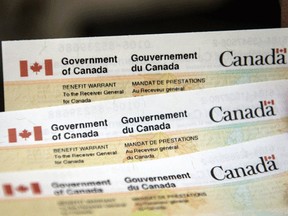Four years after COVID-19, courts continue to hear cases challenging eligibility for CERB and other benefits
Reviews and recommendations are unbiased and products are independently selected. Postmedia may earn an affiliate commission from purchases made through links on this page.
Article content
It’s been more than four years since the government launched its first COVID-19 relief program in the form of the Canada Emergency Response Benefit (CERB), ultimately replaced by the Canada Recovery Benefit (CRB). But the courts continue to hear cases brought by individuals who have been asked to repay benefits they should have never received because they simply didn’t qualify.
Advertisement 2
Article content
As a reminder, the CERB was offered for any four-week period between March 15, 2020, and Oct. 3, 2020, if an applicant could demonstrate they stopped working “for reasons related to COVID-19” and had income of at least $5,000 from (self-)employment in 2019 or in the 12 months preceding their first application.
The CERB was subsequently replaced by the CRB, which became available for any two-week period between Sept. 27, 2020, and Oct. 23, 2021, for eligible employees and self-employed workers who suffered a loss of income due to the pandemic. The CRB’s eligibility criteria were similar to those of the CERB.
A couple of benefit cases that recently found their way to court caught my eye. The first, decided in May, involved a taxpayer who was seeking judicial review of a Canada Revenue Agency officer’s decisions that the taxpayer was ineligible for several benefits, including the CRB, Canada Recovery Sickness Benefit and Canada Worker Lockdown Benefit.
In March 2022, the CRA informed the taxpayer he was ineligible for all three benefits because he did not meet the $5,000 minimum income requirement (among other conditions). In November 2022, he requested a second review of the CRA’s decisions. The CRA had several calls with the taxpayer and/or his wife, before reconfirming, in August 2023, its initial decision to disallow the benefits.
Article content
Advertisement 3
Article content
The taxpayer then sought a judicial review of the CRA officer’s decisions in Federal Court. As in all COVID-19-benefit-eligibility cases, the court was tasked with determining whether the CRA’s decision to deny him the benefits was “reasonable” and “appropriately justified, transparent and intelligible.”
The judge noted that to be eligible for COVID-19 benefits, a taxpayer must have had a total income of at least $5,000, and the legislation expressly states that income from self-employment is “net income,” which is defined as “revenue from the self-employment less expenses incurred to earn that revenue.”
The judge went on to explain that when the benefits were first introduced, “to enable Canadians to access these benefits as quickly as possible,” taxpayers “simply attested that they met the eligibility requirements.” The CRA was then tasked with substantiating all benefits issued and validating such payments where eligibility was in question.
In this case, and based on the taxpayer’s documentation provided to the CRA, the agency determined the taxpayer had earned gross self-employment income of $12,780 in 2019, but had expenses that year totalling $25,120.
Advertisement 4
Article content
As a result, the CRA determined the taxpayer’s net self-employment income was actually a loss of $12,340 (gross income less expenses incurred to earn the revenue). In addition, he had reported negative net self-employment income in his 2019, 2020 and 2021 tax returns.
The taxpayer’s main argument was that he disagreed that eligibility for the benefits was based on net income as opposed to gross income. Ultimately, however, the CRA officer did not have any discretion to depart from applying the appropriate eligibility criteria, which was a $5,000 net income test.
The judge dismissed the taxpayer’s case, concluding: “While I am sympathetic to the (taxpayer’s) circumstances, this court has held that it is (the taxpayer’s) responsibility to ensure that they meet the eligibility criteria.”
The second case, decided in April, involved a taxpayer who applied for and received CRB payments for 26 two-week periods from late September 2020 to the end of October 2021.
The taxpayer said he worked part time in 2019 to arrange a theatre and festival tour, which was shut down due to COVID-19. As part of his work arrangement, he said he had received advancements of more than $5,000 to his personal bank account from a patron. He provided four bank statements, but said he didn’t have any invoices.
Advertisement 5
Article content
The taxpayer said he was supposed to pay back the advance payments from the tour revenue and that this was an informal, oral arrangement that was not reported in his 2019 tax return. He also confirmed he had no other income in 2020 or 2021 and conceded at the hearing that he had no other documents he could have provided to prove his income in 2019.
The taxpayer said the CRA “unreasonably” determined that his reported 2019 “income” constituted a loan, rather than advance payments meant to represent the time he spent working on the tour. He argued that an advance and loan are two different things and that an advance should be considered income, notwithstanding the fact that it had to be paid back because the tour didn’t ultimately go through.
Recommended from Editorial
-

CRA, day trader argue over CERB claim
-

CRA wins one, loses one over pandemic benefits
-

CRA is cracking down on COVID-19 benefit payments
The judge decided the amounts received were simply not income.
“By any definition, a payment that has to be returned because the work has not been accomplished cannot be considered as income,” she said.
The judge also said that regardless of whether the payment was a loan, an advance payment or income, the fundamental issue in this case was that the taxpayer provided no evidence, besides his bank statements, to confirm the payment was, in fact, work-related. The e-transfers he provided were unsupported by any invoices, receipts or documentation.
Advertisement 6
Article content
As a result, the judge determined that the CRA officer properly considered all the taxpayer’s evidence and explanations. Based on that review, it was “reasonable” for the officer to conclude the evidence did not sufficiently show that the taxpayer had met the $5,000 income requirement. The taxpayer’s application for judicial review was therefore dismissed.
Jamie Golombek, FCPA, FCA, CFP, CLU, TEP, is the managing director, Tax & Estate Planning with CIBC Private Wealth in Toronto. Jamie.Golombek@cibc.com.
If you liked this story, sign up for more in the FP Investor newsletter.
Bookmark our website and support our journalism: Don’t miss the business news you need to know — add financialpost.com to your bookmarks and sign up for our newsletters here.
Article content






















Discussion about this post